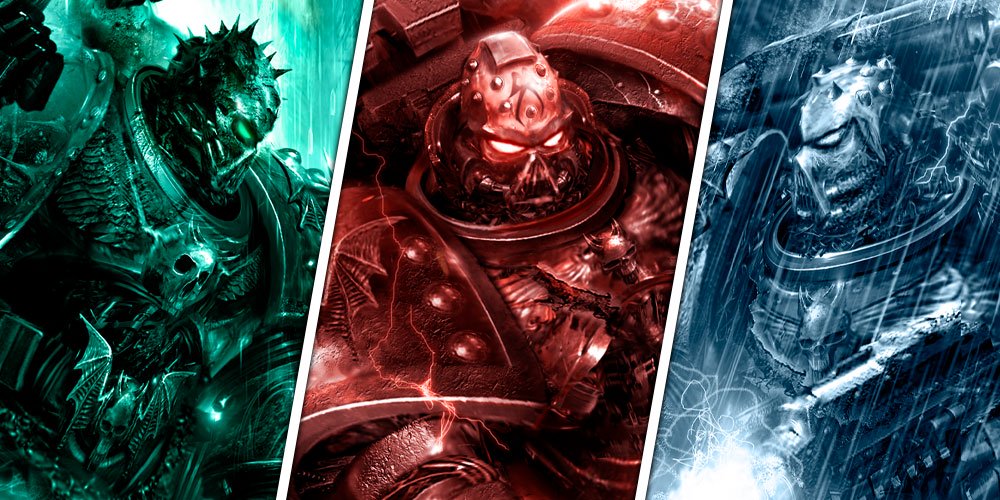
Welcome, 40K fans, to a series of articles I am writing about some of the deeper aspects of Warhammer 40,000.
These articles are a thought exercise, and by writing them I hope to improve my thinking about 40K and its fiction (and maybe about much more). Topics in this series will be wide-ranging and will not shy away from moral or philosophical issues that some may consider sensitive or even controversial. I would rather risk the conversation, so while you or I may not agree, I look forward to hearing why. Consider yourself warned for lore spoilers as well. Also, check the Tactics Corner for more great articles on gaming in 40K!
Before You Sit on the Couch…
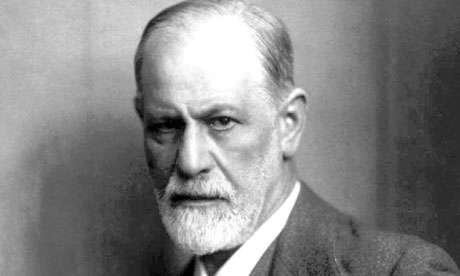
For today’s philosophy session, I wanted to bring things back in time a little bit to when I started really considering Warhammer 40K stories. We have talked before about what makes 40K fiction real literature, and have challenged the misconceptions that exist about the value of science fiction and fantasy novels as subjects for serious intellectual consideration. In that spirit, I want to share with you all the first attempt I made to critically analyse Warhammer 40K fiction. To present this, I need to give you some context.
Years ago as I was pursuing my writing degree, I was given the sometimes deceptively tantalizing option to “choose my own topic” for an essay in my critical theory class. As many have also likely experienced during the course of university, this sometimes does not always mean you can actually do that. I was fortunate that I was given free reign on which books I used for my analysis, however I had to choose a lens to write from – and I was encouraged to use a lens that I either didn’t like or didn’t understand very well. For me, this meant that I needed to choose a Freudian analytical method, mostly because I didn’t understand it very well. The result was this essay – an exploration of how Freud might approach the narrative and themes of 40K as experienced by the characters in The Night Lords Omnibus.
Thankfully, the essay was well received (after a heavy dose of background context of the universe for my professor, which I have spared you all from here). I received an excellent grade, and hot on the heels of my success, sent a copy over to Aaron Dembski-Bowden. Considering his response (hint: Mortarion’s scythe), I either left him speechless, or I more likely embarrassed myself to the point that he did not have the heart to tell me his thoughts. Either way, it was a fun thought experiment, and was the seed that started me on the path of considering 40K and its themes from a variety of perspectives.
If you haven’t already, pick up a copy of The Night Lords Omnibus. Even as an avid loyalist, and despite how cruelly the author treated my Blood Angels, it was a fantastic read and is worth your attention. Reading it will also enhance your understanding of this essay.
An Important Disclaimer

Finally as a disclaimer, the purpose of this essay was to intentionally stretch my understanding of the Freudian method of literary analysis by making convincing arguments to support that viewpoint. That does not mean that the things in this essay are the only true ways to interpret the novels, 40K as a setting, or Astartes/Night Lords as characters, though I will say it was a lot of fun as a mental exercise. Furthermore, this essay does not represent how I ultimately view these books, my own thoughts on human psychology, and the representations of characters described below, and therefore the essay should not be taken as a 100% true reflection of my personal beliefs or philosophy. Remember that we think so that our thoughts may die instead of ourselves.
With that in mind, I hope you enjoy this version of my essay optimized for an audience already familiar with the universe. As a matter of course, this essay considers events in the omnibus that definitely fall into the spoiler category. Consider yourself warned.

Psychological Analysis and the Dark Millennium – A Journey into The Night Lords Omnibus by Aaron Dembski-Bowden
The Night Lords Omnibus is a combination of three novels by Aaron Dembski-Bowden, published by The Black Library, separately titled as Soul Hunter, Blood Reaver, and Void Stalker and then compiled into a single-volume collection. This is a work of science fiction set in the Warhammer 40,000 universe, and catalogues the story of Talos – a genetically modified super-soldier – and his journey to seek vengeance upon a human empire that he helped create and then betrayed. It is important to note that the author is not the inventor of this universe, so an analysis of the author’s work only serves to broaden our understanding of this specific set of novels in this particular instance in what is now a vast and expansive universe, and the limitations of writing within someone else’s intellectual property must be properly considered.
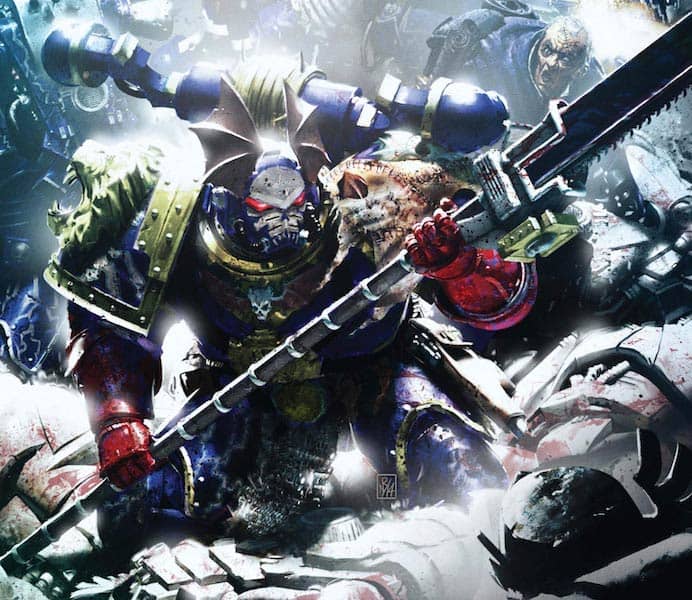
Astartes as Freudian Characters
There are several key things to understand about Astartes as characters in this fiction. The first thing to understand is that they are all men. To become a space marine, a boy in his adolescence is taken and subjected to genetic enhancement, a varied process that can kill more candidates than it can enhance depending on the particular genetic heritage. Once the transition is complete, the ascended warrior casts off and essentially forgets the life he owned before including all of the old relationships and connections. This can occur both during the procedure itself or as a result of post-procedure psychological conditioning. Astartes are, for all intents and purposes, no longer considered human; being engineered to be immune to fear and beyond the weakness of certain basic human needs, including feelings such as romantic love and sexual desire. In addition to losing these, they are gifted with incredible physical attributes that turn them into living weapons. By losing typical human weaknesses, the Astartes become the epitome of the perfect warrior. Inasmuch as their old familial bonds are taken away, new bonds form and exist between Astartes as warriors united under their father figure (called a primarch) who’s traits and tendencies Astartes all inherit to varying degrees. This creates a warrior society dominated by men, who call and consider each other brothers, often referring to each other as “battle-brothers” due to the warlike nature of their calling. While traditions vary between the different brotherhoods along the antagonist/protagonist divide, their relationships remain fundamentally familial.

Reading that summary, one would ask themselves how they would relate psychoanalysis to characters that, on paper, seem without a Freudian id – with no libido – who are thrown together in a transparently misogynistic, repressive totalitarian regime (a topic which could justify its own separate article)? The answer lies in the relationships that these men have with each other, their mortal counterparts, who are used as a lens through which we can perceive an Astartes character from a more conventional human perspective, and their relationships with their father figures, the Primarchs. Never once in the 100+ novels in this universe have genitalia been mentioned as part of an Astartes, nor have they been subject to the desires of typical human procreation. The desire to procreate instead evolved into a desire to protect special organs called “progenoids” where genetic material is stored in their bodies until finally harvested upon death for implantation into new recruits. Great pains are made to gather and preserve these organs, as they represent the future of the warrior brotherhood. Progeniods can carry everything from the collective memory of each warrior’s generationally preserved “gene-seed” (as opposed to the typical male seed), with traits tied to the abilities and competencies of the dead warriors. Essentially, a warrior will live on after death through the passing forward of his genetic material to new initiates via the progenoid glands. Progenoids are not a phallus, but Freud knows what they are there for as clear as daylight.
A Dark Protagonist
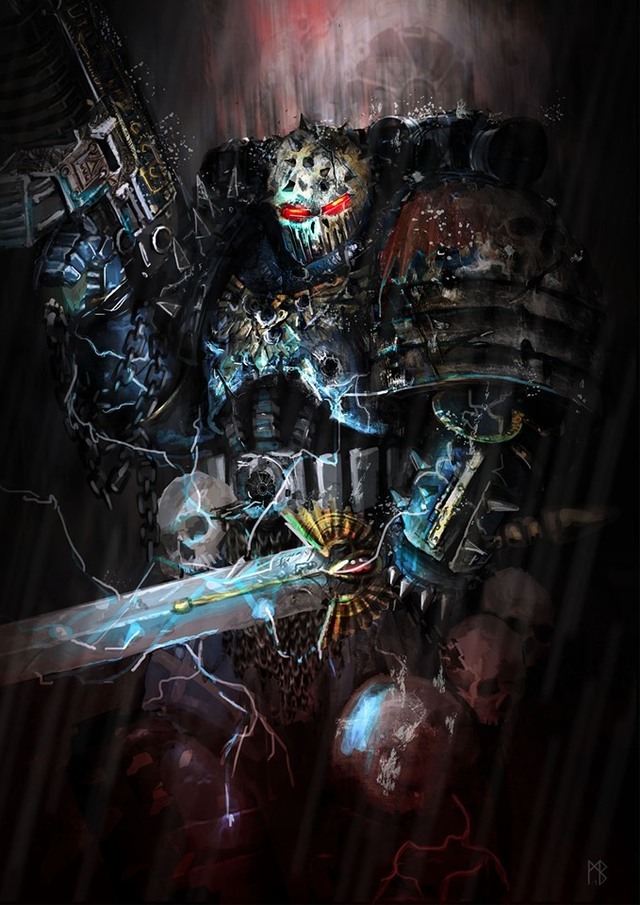
This is where we begin to understand Talos. Talos’ relationship and feelings regarding the state of his brotherhood after the assassination of his father, and his perceptions of his mortal counterparts, make for a compelling narrative. A family and development cycle is represented as a warrior brotherhood instead of a traditional family unit, with a collective unconsciousness separated from the normal human apparatus replaced by one of an ascended race of warriors tied to a singular bloodline. Many stories and relationships form in the course of these novels around the transformed idea of familial bonds between soldiers instead of a nuclear family.
To bring this back to Freud, the Astartes experience the world and manage to cathect and develop through many of Freud’s established developmental cycles, though not in the standard way that a normal human would. The initiate stage of their life cycle immediately post-ascension is comparable to a new birth, so they start all over with the Oral Phase at an adolescent age as they learn to use and control their new bodies. Instead of the oral nourishment of a mother, they are now succored by violence. The id of a Space Marine is the inbred hatred of the enemy and the alien, as well as the show of strength and skill among brothers. As opposed to repressed sexual energy, their energy is caught up in the repression of their violent desires. Each of the supporting cast of Night Lord brothers in Talos’ squad display this pleasure principle in a different way.
It is important to note that this story is told from the universe’s archetypal villains, and not the heroes. This creates an interesting subversion of the hero’s journey, making it a “villain’s journey.” No matter your reading, Talos and his kin are bad people doing bad things to others in order to exact vengeance for wrongs real and often imagined. They have all endured and inflicted great trauma on/from their universe, and their actions are cruel beyond the need for survival.
Dissecting the Mentality of Astartes
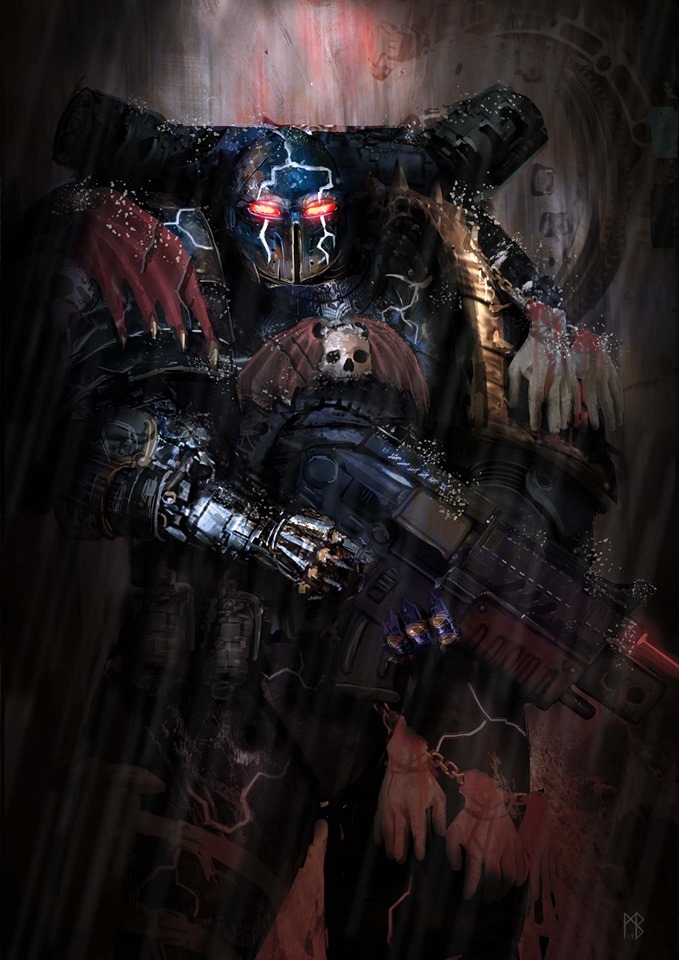
To return to Talos and his immediate brotherhood – known as “First Claw.” or the first squad of ten squads in his battle company – the warriors of this now dilapidated force of super-soldiers cathect in different ways. The warrior Uzas can barely stop himself from cathecting. His need for violence and hands-on murder has earned him the attention of the war-deity of the universe, eventually regressing his persona to the point where he can barely communicate with words for his need to kill. Cyrion represses his desire to cruelly torture helpless victims, feeding his id off of their screams and torments. He forms an antagonistic role to Uzas, and regularly takes advantage of Uzas’ reputation as a blind murderer to cover up his own murderous and arguable more despicable tendencies. Cyrion is clearly stuck in (or regressed into) the phallic phase, on the verge of a transition to servitude to the universe’s lascivious god of excess. Xarl, Talos’ oldest companion, and a friend from prior to their ascendance, is a champion who revels in contests with elite opponents. Xarl, the better warrior and thus an object of respect among the warrior hierarchy, provides a lens through which we look at the issues of Talos from the perspective of a more individuated brother.
Talos, while the leader of First Claw, is not the leader of the warband First Claw journeys with. That role is taken by a character named “The Exalted,” who has moved on from the old bonds of brotherhood in the pursuit of personal power via demonic possession (a dark exaltation), a process that has left the Astartes portion of his psyche repressed and subservient. The Exalted is threatened by Talos, and has an anal retentive need to be in direct control of his surroundings and circumstances, and cathects through the masterful execution of three-dimensional space combat between warships. This need for control is constantly frustrated by the random and powerful influence that Talos has on their warband which comes from the prophetic visions that Talos is consumed by seemingly randomly. These warnings have served both as a warning of danger and a portent of great success in the warband’s piratical raiding, making Talos too valuable to simply kill and be done with. The Exalted acts as a consistent antagonist from within the brotherhood (though also apart because of the effects of his possession/ascendance) through the first two novels as he tries to exert control and conspire against a protagonist (Talos) who he perceives as a threat to his position. The Exalted’s neurosis causes him to be obsessed with control, and he ultimately dies as a result of loss of control at the end of the second book. The irony of this loss of control is that the demon personality – so obsessed with domination over the human psyche of the body it was invited into in exchange for power – is undone in its last moments by the rebellious acts of the space marine host’s psyche before the body itself was lost in a beautiful and powerfully-narrated cathection of naval combat prowess; a demon destroyed by its inner human.
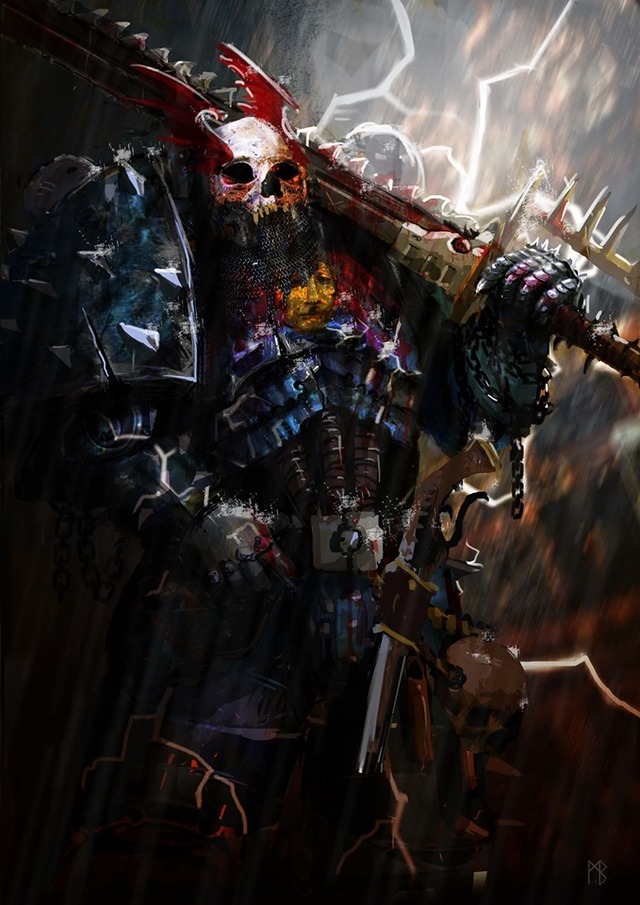
Inside this morass of self-destructive tendencies sits Talos. Talos’ own neurosis is an obsession with loss. He has lost his purpose as a being created to protect humanity now seeking the downfall of the Imperium he helped create. He lost his homeworld, participating in its destruction at the whim of his mad Primarch father. Later, he loses his father to an assassin, which has the byproduct of sundering his brotherhood into disparate warbands. In his own words:
“I devote each beat of my heart to tearing down everything I once raised. Remember this, remember it always: my blade and bolter helped forge the Imperium… This is not mere vengeance. This is redemption. My right to destroy is greater than your right to live.”
The Night Lords Omnibus, iBooks edition, (pg 12-13).
Talos was nicknamed “Soul Hunter” by Kurze prior to his assassination because Kurze had a vision that Talos would defy Kurze’s last order to let his assassin escape. Disobeying the last wish of his father (thus validating the hated moniker of Soul Hunter) was an act of defiance and rage against a new era in the development of his legion. In essence, it was Talos rebelling against the idea that he needed to let go of the way that things were, and rebelling against his father who he felt abandoned him to an uncertain future full of unwanted change. Talos confides at one point to the remnants of First Claw of his father Kurze’s private confession to him:
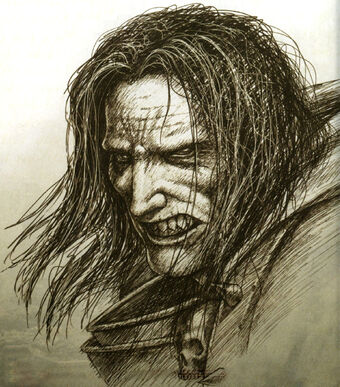
“… I hate this legion, Talos. I destroyed its world to stem the flow of poison…do you truly believe I care what happens to any of you after my death?”
The Night Lords Omnibus, iBooks edition (pg 1,587)
This is Talos’ castration anxiety. Compared to his father, what good are his gifts at leading his brotherhood-family? If his father couldn’t escape his fate with his mighty gifts, what use are Talos’ gifts?
At the beginning of the story, Talos and first claw are aboard a derelict craft scavenging for supplies. Taking a moment, Talos thinks to himself:
“This… this piracy offended him now, as it always did, and as it always had since they’d been cut off from the legion decades ago… A curse upon the night the VIII Legion was shattered and scattered across the stars. Diminished. Reduced. Surviving as disparate warbands – distant echoes of the unity within loyalist Astartes…”
The Night Lords Omnibus, iBooks edition (pg 26)
Talos is obsessed with what he used to be, what the legion brotherhood used to be, and adopts his father’s judgmental, condescending attitude towards his fallen brotherhood – an issue that Xarl (who has accepted himself, the legion, and his role in the brotherhood) makes a point of confronting him with on several occasions. Talos hates the name Soul Hunter. He hates being called the Prophet, or the Seer. Talos during the course of the books keeps a tight lid on his id, never allowing himself to cathect. He detests the authority and influence that his visions give him over his brothers. Talos also hates how this influence puts him in conflict with the Exalted, who he despises for abandoning the brotherhood for something impure.
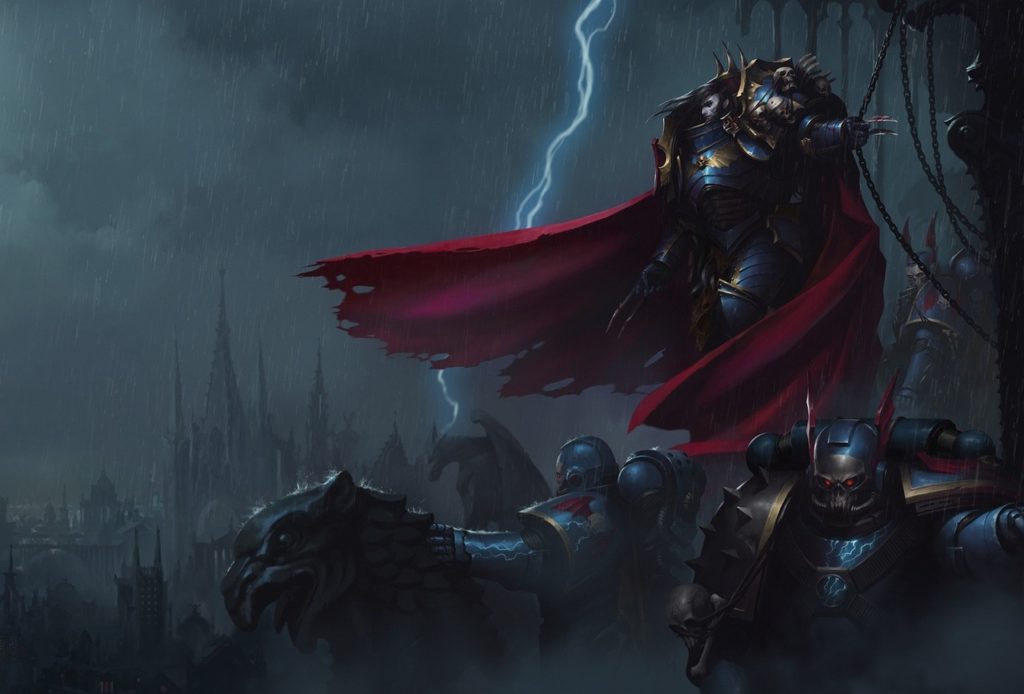
The Exalted represents to Talos everything that is wrong with his legion, choosing to allow the corruption of a demon and a lust for power drive him away from the traditional notions of the legion and separating him from his brothers. Despite his hatred of him, Talos never wants to do what is necessary to get rid of the Exalted because he hates everything that his brotherhood has become. Then the death of the Exalted from an outside source brought the unwelcome mantle of responsibility to Talos’ shoulders, an occurrence that only made his problems worse.
It is Talos’ journey to overcome the limitations of this obsession with loss that marks the progression of his story, ultimately leading him to the acceptance of the evolution of his legion’s brotherhood. Sparked by the death of Xarl – his last link to a home destroyed – and recognizing that he has no place in the future of his brotherhood by the end of the third novel, Talos sets his legion up for their future at the cost of his life and the lives of First Claw. In that realization, he finds a reconnection with his dead father as he confides in the remnants of First Claw:
“Sometimes, I almost know how he felt… we hide, we run and flee, we raid and ambush…and suffer the endless tide of fratricide. I killed my own mother without knowing her face. I have killed… my own brothers in the last century alone, almost always in idiotic battles… I have no wish to unite the legion. I hate the legion. Not for what it is, but for what it made me become.”
The Night Lords Omnibus, iBooks edition (pg 1587)
Ultimately, the death of Talos at the end of the series allows for a resurrection of sorts, as his legacy is passed on to the next generation of Night Lords through the harvesting and re-implantation of his genetic material. This scion represents a sort of reincarnation of a Talos who is ready to move forward into the new brotherhood of his legion. This reincarnation, named Decimus, comes about as the direct result of the original Talos’ interaction with non-Astartes; regular humans who provide a means for his resurrection (though not willingly, as befits as damaged and cruel a character as Talos was).
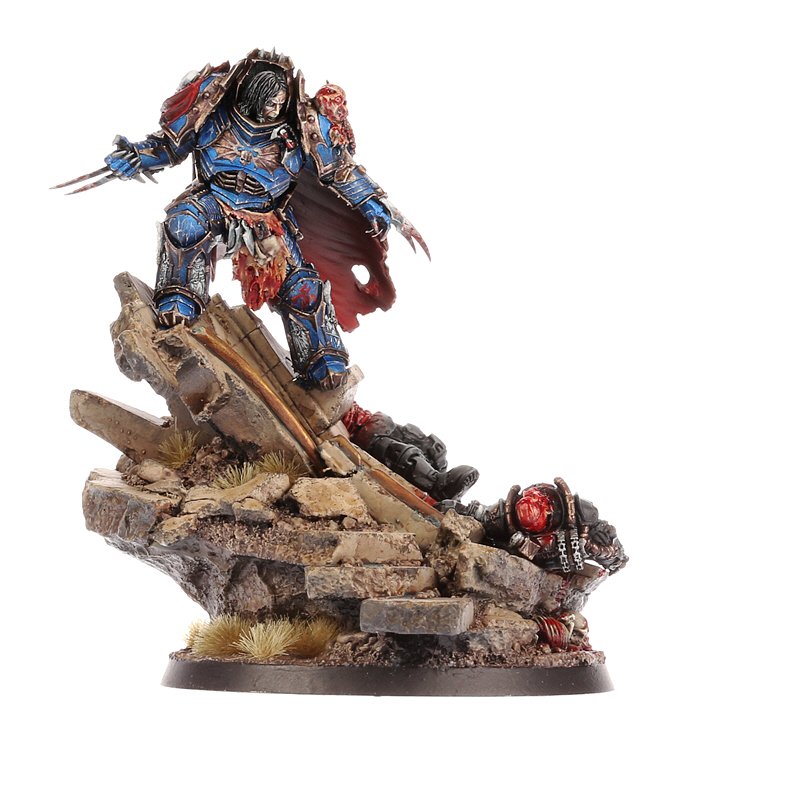
It is especially important to note that before Talos can undergo this reincarnation, he has to accept not only his own fate but also the changes in his legion’s brotherhood – and how he doesn’t fit into that brotherhood in his current incarnation. Talos becomes a literal example of psychological growth in that he lets the parts of him that cannot face the future die (himself) and replaces the non-functional self with new ideas (a new body in the form of Decimus) that have adapted to the reality of the now. Until doing this, he would never be able to fulfill his potential and become the individuated leader who unifies his brotherhood and drives them towards their goals.
Mere Mortals as Sexual Surrogates
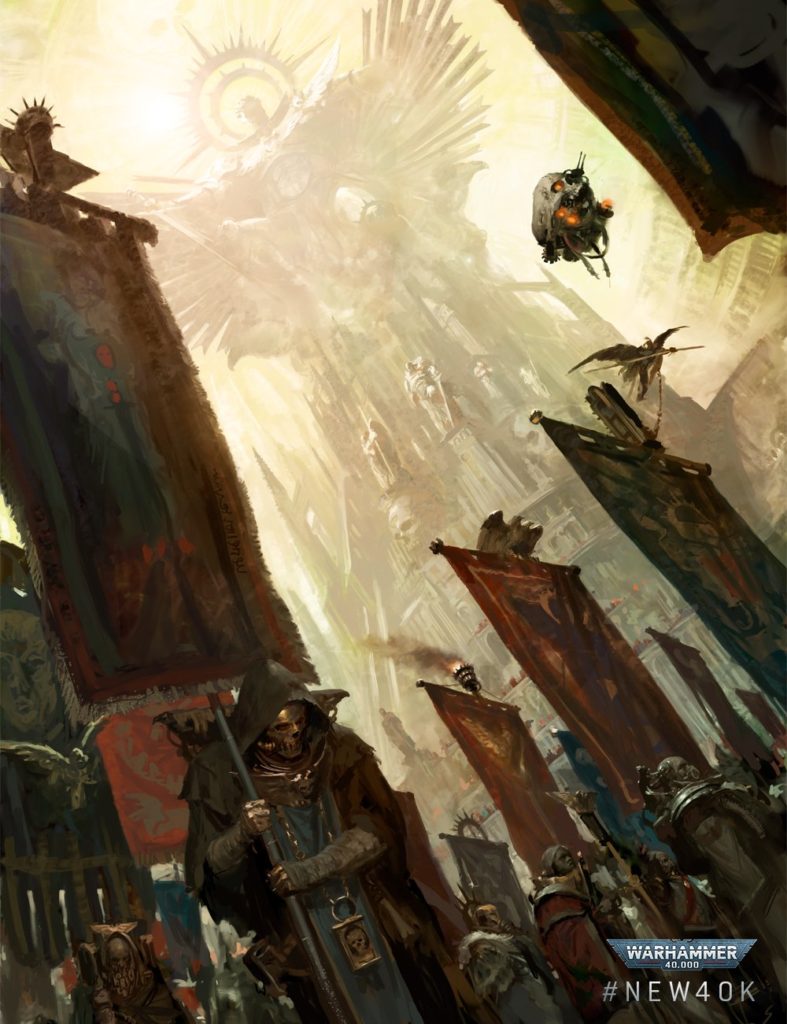
As essentially a new race of humanity both above mortal desires and at the same time exaggerated versions of them, it can be easy to get lost in how little the average person could relate to superhuman male demigods murdering their way across the galaxy. This is where the human cast of the novel comes in as the lens through which a normal human like the reader can see this dark world. As was mentioned, the Night Lords are not good people. They are lords – superior to humans in nearly every way – and with power and superiority come certain privileges. The most valuable resource in their war is as much in manpower as it is in war materiel, as it is the humans who serve the Astartes that do the necessary work that the Astartes consider beneath them. To maintain themselves, their gear, and their status, competent slaves are necessary for these exiled traitor Astartes.
Septimus, the primary human lens, is Talos’ principle slave. Septimus is the epitome of the repressed id, for even his name was stolen from him when he was forced into slavery to Talos. Septimus is the seventh such slave-servant to Talos (the number from which his new name is derived), and his sole existence is to serve his master by cleaning and servicing his armor, serving as a pilot transporting them to and from conflicts, and attending to whatever needs that Talos seems fit to have him perform. Septimus has come to accept his position and the futility of resisting his lot in life – the alternative being agonizingly slow death via torture from 10,000 year-old madmen with lots of practice. This horrible little world is shaken with the arrival of the only main female character, Octavia the eighth slave.
Octavia is a navigator, which essentially makes her indispensable. Bred specifically for the mutation of a third eye in her forehead to guide ships in transit across large distances of space. Ships must travel by opening what is essentially a gate into the hell-realm of the Warp, and only those with the third eye can look into it and find a path to the desired destination. Octavia is captured as the result of one of Talos’ visions early in the first book. Having a slave of such quality only shifts the balance of influence in Talos’ favor even more, causing more friction between him and The Exalted. Septimus is tasked with acclimating her to her new way of life, something that eventually has a drastic impact on Talos’ individuation.
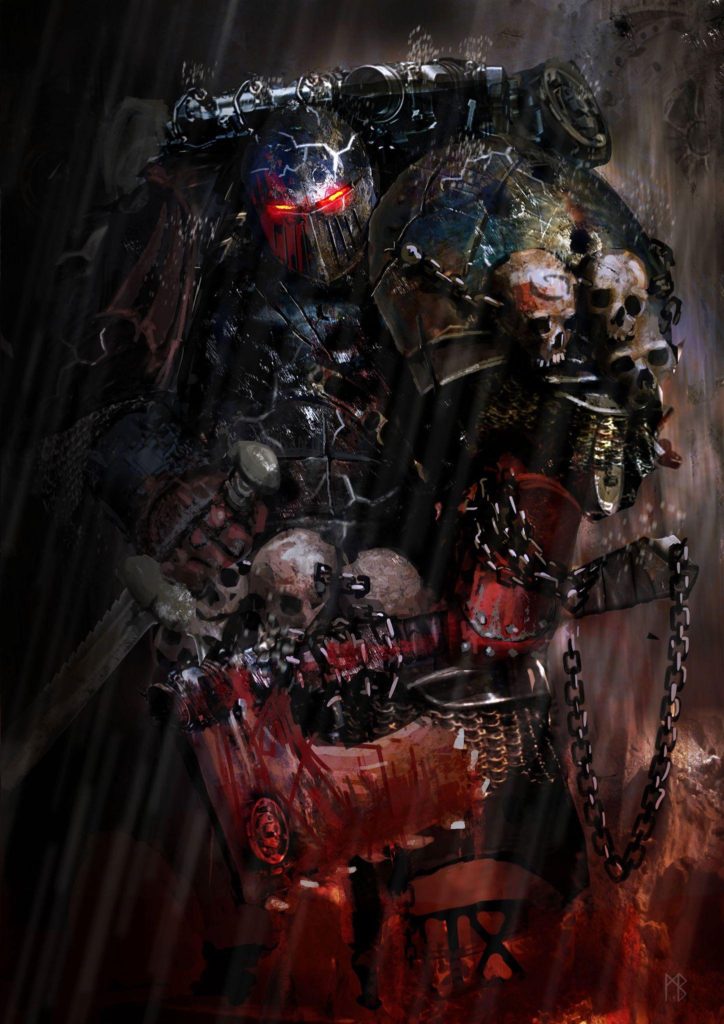
Octavia is decidedly portrayed as female from a Freudian perspective – concerning herself a lot with her appearance with obvious textual nods to what could be considered typical emotional idiosyncrasies of women, including bouts of intense emotional outbursts. She also acts as a moral compass to the acclimated slaves. She has not yet become resigned to the lack of conscience displayed by the other slaves as they carry out the often bestially demeaning and cruel tasks for their demigod masters, who occasionally even hunt their slaves out of boredom for sport while in transit on their warship. She is drawn to Septimus as he is her only human guide into this new life she has been forced into, and though she resists the idea at first, eventually she seeks romantic satisfaction from their relationship. This fits well into a Freudian narrative of women lacking a superego. She can’t help herself but be attracted to the only real eligible male, despite the risks to him by displeasing his master.
Septimus at this point begins his journey away from his repressed slave worldview as he develops feelings for Octavia. He spends much of the first two books denying his latent desires and suppressing his id, and not for bad reasons. Under the threat of reprisal from Talos, he denies his desire for Octavia for a long time. As he is an artisan, and much of his time is spent in the skillful repair or creation of the salvaged and dilapidated wargear of Talos’ ragtag band, he cathects through scandalous drawings of Octavia at his workbench, which she of course finds later prior to their secret courtship. Their first attempt to act upon their desire for each other is interrupted by Talos, and it serves well as an example of distinguishing behavior between Astartes and mortals. Talos, upon witnessing the as of yet incomplete sex act, looks at it much as we would look upon a purebred female dog mating with a mixed-breed mutt, and orders them to stop as he requires Septimus for a task. Septimus is ordered not to pursue such foolishness again, but ultimately succumbs as his desire for Octavia exceeds his fear of his master’s wrath.
Talos’ visions take him out of commission for an extended time, as they cause him physical pain as he experiences them. He wakes to find Octavia pregnant, and proceeds to violently enforce his displeasure on Septimus. Beating him as painfully as possible and within an inch of death, Talos warns him to stay away from Octavia or be slowly tortured to death. Octavia’s indispensable value as a navigator protects her from receiving punishment. This perspective is an oversimplified summary of the dynamic of their relationship, but from the perspective of a Freudian psycho-analyst it is important to point out the differences in their treatment. The male is punished for letting his id out of the box, but the woman is protected.
It is important at this point to point out the value of the human stock. Astartes cannot procreate; they require mortal children in order to create new warriors from their progenoids. As much as these mortals are slaves, they are also necessary. As Astartes are not capable of sexual desire, they are still interested in their future and cannot create such a future without the presence of children who can receive their genetic legacy The Night Lords, being an unethical bunch by any standard, go to devious and heinous lengths to protect their own future.
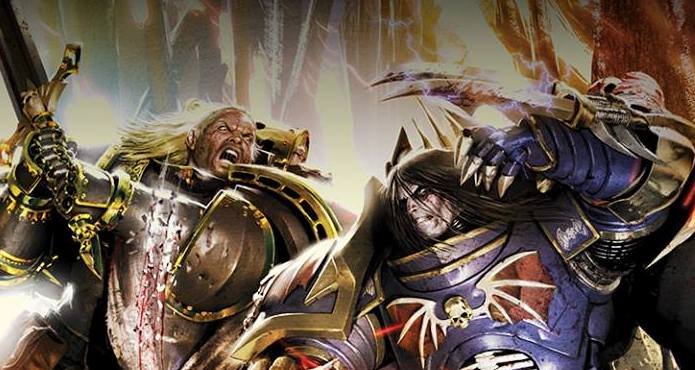
As Talos refuses to cathect out of protest to his hated environment, he then passes that along to his slaves Septimus and Octavia. As he punishes himself for his cursed existence and is forced into positions of unwanted authority and leadership over his hated brothers, so then does he punish the budding relationship of his slaves. Later as he comes to realize that as he is he has no place in the new brotherhood that his legion is evolving into, his visions lead him to the realization that the child of Octavia and Septimus will be significant to his legion’s future. This realization and the subsequent use of Talos’ progenoids in the child acts as the resolution of the castration anxiety of the old Talos, who was mired in the past and his own inability when compared to his father and his father’s leadership.
Though Octavia and Septimus are ultimately set free by Talos prior to his death as his final battle approaches, he does so knowing that they will be found and that the child in Octavia’s womb will be used for the future of his legion. Indeed, setting them free is a symbolic act of letting go on Talos’ part, and it has less to do with being merciful and more to do with Talos letting go of his old self. The result? Decimus (the individuated Talos) comes to unite a gathering of the disparate warbands of the Night Lords, ready to capably ascend to the roles he so despised in his previous life.
Conclusion
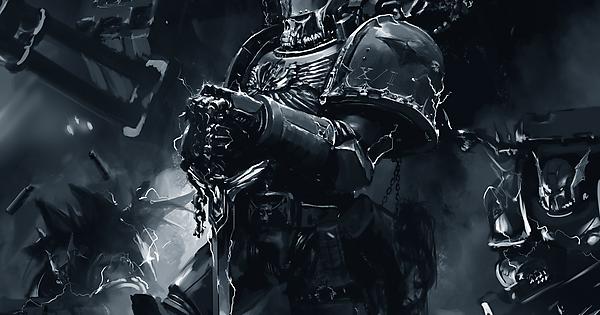
So we see that despite the surface-level obtuseness of a post-human warrior with no ability to procreate, Astartes can still be caught in the traps of the Freudian idea of the human psyche. Using the bonds of brotherhood and the relationship between Primarch father and Astartes son we have a cohesive family unit in which an Astartes transitions through the various phases of development, complete with castration anxiety and residual neurosis from developmental traumas. Utilizing the lens of mortals as human surrogates for a biological inability to procreate, Astartes are in essence reaching a sexual maturity by passing their legacy on to a new generation of initiates. In particular, Talos transitions through his developmental psychosis using Octavia and Septimus as sexual proxy to create a new version of himself ready to face the future. Now individuated, the new Talos can take up his mantle of leadership over the new brotherhood, completing his psychological journey.
An Ongoing Conversation
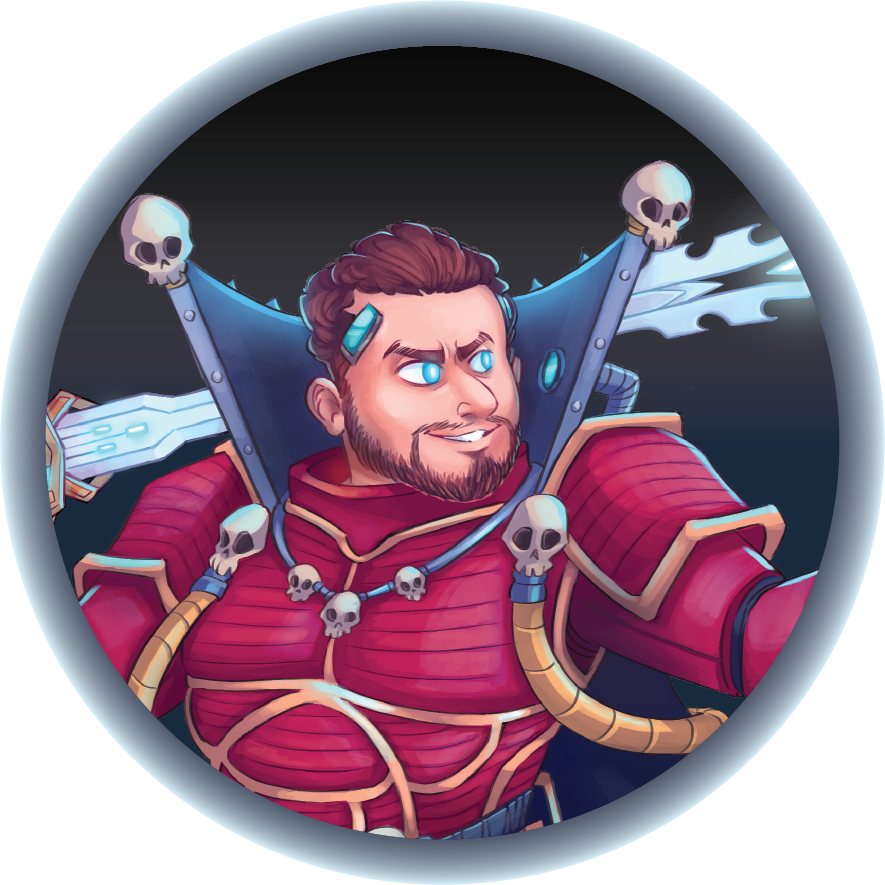
If you found this interesting, please check out my page Captain Morgan’s Librarius. You can also check out the content on my new YouTube channel for audio versions of my articles and other 40K videos. These are the spaces where I test these ideas in their first drafts, and also talk about all the other parts of the hobby that I enjoy from painting, community, and gaming to all the rest. It’s also the best place to converse with me about this and many other topics in 40K. Likes and shares are appreciated. I hope you enjoyed this week’s read, and I’ll see you again next time!
And remember, Frontline Gaming sells gaming products at a discount, every day in their webcart!

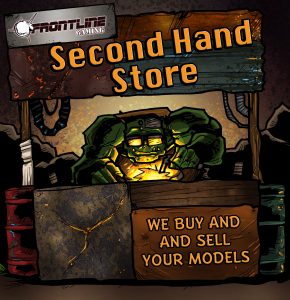
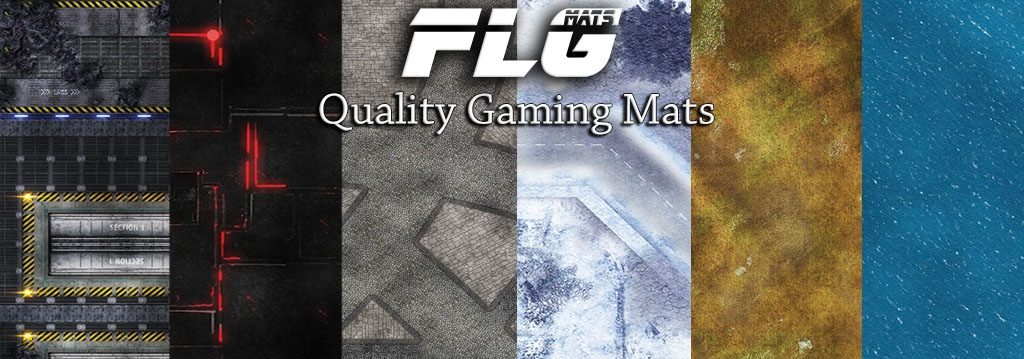
cut you at least credit me when you use my pics?
Which are yours? We’re always happy to credit artists but often the writers simply do a google image search and pull ones they think fit, they don’t know who the artists are most of the time, they’re not going to your personal pages or what have you and so much of the art out there is in the public domain so it’s not super efficient to try and track down each image’s creator (if even possible to determine).